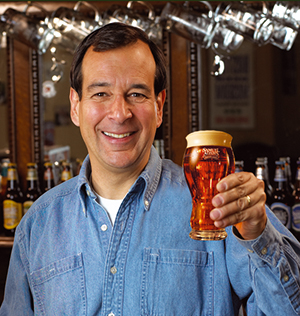Saving the planet
What’s more interesting – gaining insight into U.S. consumer habits or learning more about beverage trends in the U.S.? Actually, both. That’s why attending the 2008 Beverage Forum in New York proved insightful, especially to foreigners.
If research can be believed, U.S. consumers on average pack nine hours of television into 12 waking hours. Small wonder that they tend to believe that obesity contributes to global warming. How’s that? Because sitting on the sofa in front of the telly makes people obese, so the reasoning goes. If they have to go places, they consume more energy than others. After all, it takes more petrol to transport fat people than thin people.
Many readers will now slap themselves on the thigh and heave a sigh of relief that they are not American – but be warned. The U.S. may be the soundbite society, where you make decisions without knowing the facts. Still, the U.S. in many instances is only acting as our vanguard. Perhaps us “Old Europeans” will eventually think and feel like our cousins across the Atlantic.
It is for that reason that attending The 2008 Beverage Forum in New York in May, organised by the Beverage Marketing Corporation, was worthwhile.
Admittedly, some of the papers were a bit thin on facts while strong on marketing jargon. Yet, that’s a marketers’ conference for you. No one wants to give away any true and working recipes for success - even though “Building Enduring Success” was the theme of the conference. If you really think you know what it takes to bring up beer sales in a stagnant market, you keep that knowledge close to your heart, wouldn’t you?
If the papers were strong on marketing sound bites, that’s also a consequence of American corporatism. The U.S. beverage market is dominated by large and often listen companies. What their representatives say in public has to be carefully monitored and censored so that their company’s share price does not suffer any unforeseen downturns.
As concerns corporate attendance – it was May before the Anheuser-Busch takeover saga began, yet the number of delegates at this conference was down to 2006 levels. Blame it on the economy. With the mortgage crisis in full swing and the credit crunch making itself felt, corporate travel allowances had got slashed.
Despite corporate America - the Anheuser-Buschs, the MillerCoors, the Nestlés et al. - putting in an appearance at this conference, it was nevertheless highly revealing that there are so many successful start-up companies in the beverage sector. As Michael Bellas, the Chairman and CEO of the Beverage Marketing Corporation pointed out in his address, there have always been segments with high growth where start-ups could make a splash. Remember RTD teas? Energy drinks? Enhanced waters? High-end vodkas? Imported beers? Premium wines? These were these segments that have witnessed significant growth in recent years and allowed entrepreneurs with some cash and/or the power of persuasion to make an impact.
Speaking of a splash - the least “corporate” presentation was given by Kim Jeffery, the President and CEO of Nestlé Waters North America, who heads the number one bottled water company in the U.S. with revenues in excess of USD 3.5 billion (2006). If you thought that Germany was a bizarre market, where beverage companies and the government could quarrel over the correct environmentally friendly beverage container – the returnable and refillable bottle – while consciously sacrificing a container (cans) which is an absolute must-have container all markets around Germany – well, you only had to listen to Mr Jeffery reminding the audience of the hostility his products have encountered. “Branded trash” his plastic bottles were called because when it came to saving the planet the laws in the U.S. initially were all about litter reduction and not recycling.
The recycling rate of plastic bottles is only 25 percent but could come up to 50 percent, says Mr Jeffery, if the authorities allowed for a better, that is more widespread collection of plastic bottles at bottle banks (what they call curbside litter in the U.S.).
It must have pained Nestlé that their products received such a bad press, while 50 percent of plastic containers used in the U.S. did not even get mentioned. Mr Jeffery rightfully asked: “What about the shampoo bottles, the ketchup bottles, the plastic mayonnaise jars or the huge orange juice containers?” The U.S. container laws do not capture these, he pointed out with indignation.
Mr Jeffery called for an increase in curbside recycling and for Americans to get serious about recycling. After all, per capita bottled water consumption in the U.S. is only 50 percent of that in Italy or France. Imagine how many new landfills will be needed in the years to come if U.S. consumers drink more bottled water?
At the conference, Mr Bellas of the Beverage Marketing Corporation presented Jim Koch, the founder and Chairman of the Boston Beer Company, with a Lifetime Achievement Award for having “changed the competitive landscape in the U.S. beer industry.” Having founded Boston Beer 25 years ago, Mr Koch has taken it to become the leading craft beer in the U.S. – aided by “his marketing skills and enthusiasm”. While he was presented with a sliver platter, soft music played in the background. But Jim Koch’s words could be overheard. “When they informed me about the award I thought ‘oh my God, I‘m dead and I don’t realise it.’”
Modestly, Mr Koch replied that sales of Samuel Adams during his years at the helm went from invisible to infinitesimal and that he hopes that one day they will go to small. He added that it was cool to get a lifetime achievement award for a market share that’s less than one percent. That’s why he decided to accept this award also on behalf of the other 1400 odd craft brewers who all together have changed the way Americans think about beer.


